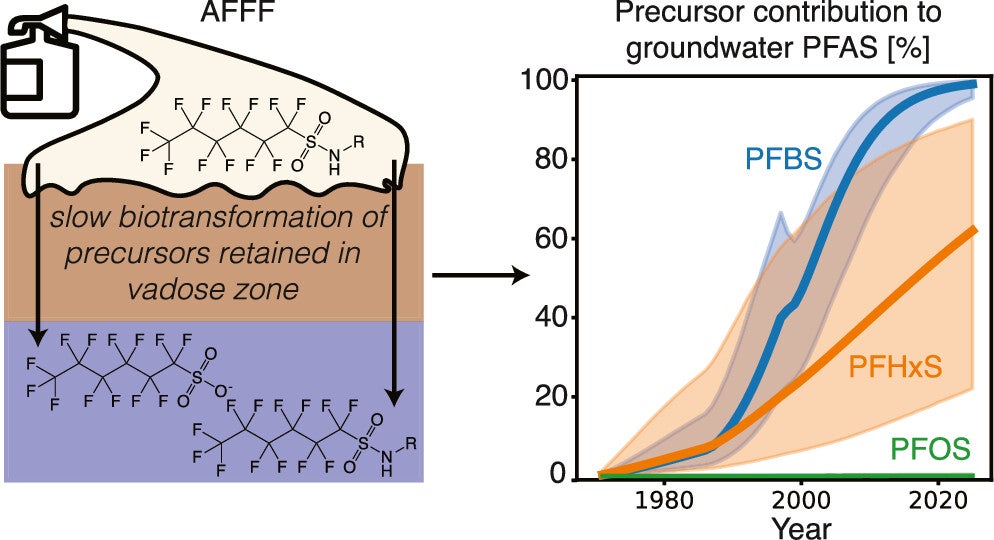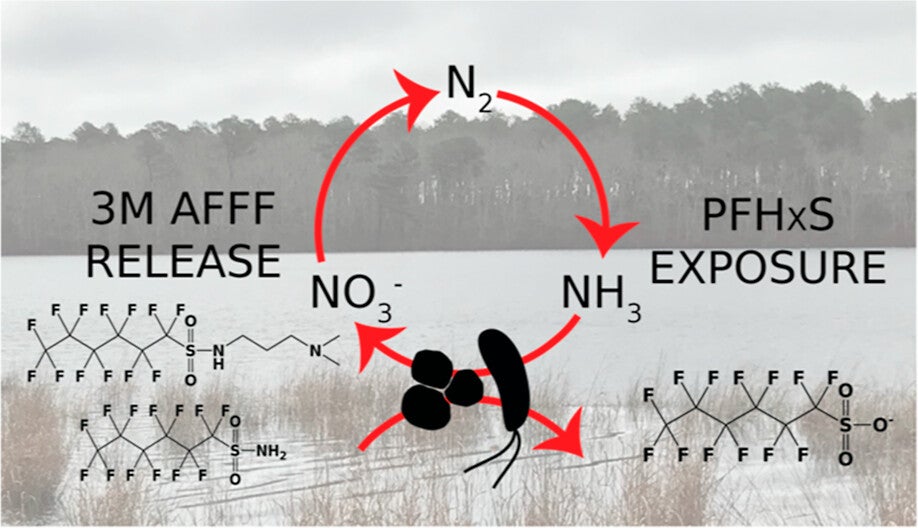Spring/Summer 2023 Newsletter
Voices from STEEP
“Our work suggests that the sociodemographic groups that are often stressed by other factors — including marginalization, racism and poverty — are also more highly exposed to PFAS in drinking water.”
Jahred Liddie, trainee and Harvard University PhD candidate with STEEP Project One: Exposure, emphasizing findings of his recent research as featured in US News.
 Team Spotlight
Team Spotlight
URI Welcomes Fabian Fisher, PhD, Assistant Professor and STEEP Researcher
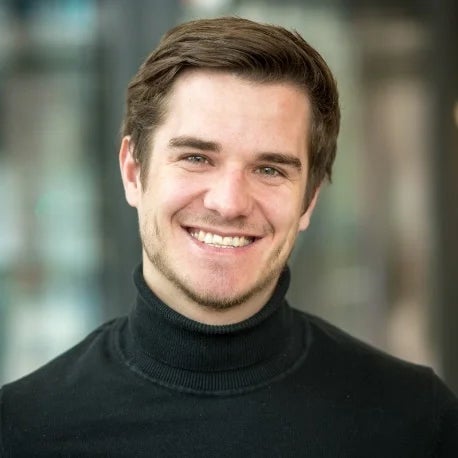 “Taking on the critical issue of chemical pollution in modern society, I’m thrilled to start my research group in URI’s inspiring and collaborative environment.”
“Taking on the critical issue of chemical pollution in modern society, I’m thrilled to start my research group in URI’s inspiring and collaborative environment.”
Beginning September 2023, STEEP postdoctoral researcher Fabian Fischer, PhD, will begin a new position as Assistant Professor in the Department of Biomedical and Pharmaceutical Sciences at the University of Rhode Island (URI). Fischer joined STEEP in April 2022 as a Postdoctoral Fellow in the lab of Elsie Sunderland, PhD, at the Harvard University John A. Paulson School of Engineering & Applied Sciences, within STEEP Project One: Exposure.
Fischer, truly an interdisciplinary scientist, combines his expertise in environmental chemistry with biochemistry, computer modeling, and public health to study how PFAS are absorbed, secreted, and incorporated into the bodily systems of animals and humans. His goal is to understand how toxins move inside organisms, with a focus on the “fate”, or final destination, of these compounds.
 Community Engagement
Community Engagement
Connecting with the Mashpee Wampanoag Tribe

In July, Justin Sankey, STEEP trainee and University of Rhode Island PhD candidate in Project Four: Detection Tools, joined René LaPointe Jameson, a research assistant at Silent Spring Institute, for the Mashpee Wampanoag Tribe’s powwow on Cape Cod, MA. Justin and René spent a full day sharing resources and talking with members of the public and of various tribes about PFAS contamination in Cape Cod drinking water, private wells, and how this relates to and impacts the long history of tribal fishing and shellfishing practices. Many visitors expressed gratitude for PFAS discussion and the information available at the community event.
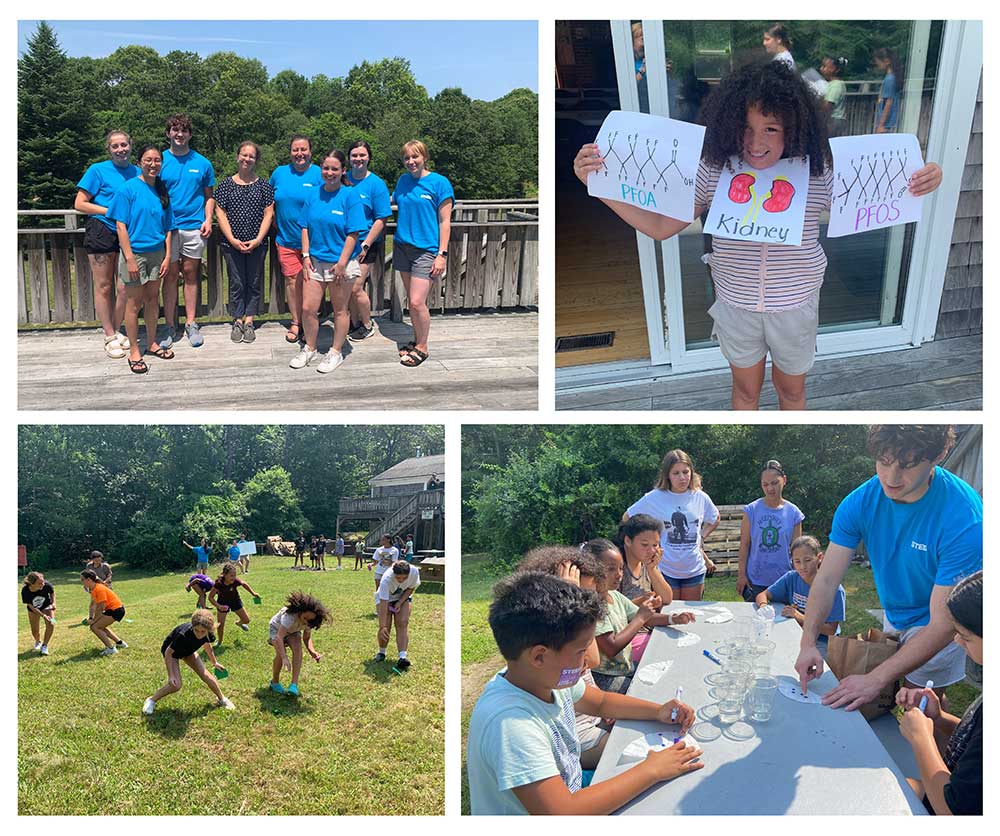 STEEP trainees and staff led a half day program at the Mashpee Wampanoag Tribe‘s science summer camp for teens: Preserving Our Homeland, in Mashpee, MA. STEEP introduced campers to the science of PFAS and chemicals in our everyday lives and environment. The morning began with a Tribal ceremony of gratitude and cleansing, involving smudging with sage and cedar, and then Jitka Becanova, STEEP lead, led an engaging lesson about chemicals in our everyday lives. STEEP trainees Justin Sankey, Melissa Woodward, Emily Kaye, and Jennifer Sun each led hands-on activities introducing campers to aspects of PFAS, demonstrating a passive sampler, guiding campers to act out PFAS accumulation in the body and the food webs, and explaining how chromatography, the separation of a mixture into its components, can be used in PFAS analysis. The day concluded with a local fish lunch and a closing gratitude ceremony. Approximately 20 campers from grades 5 through 8 participated, and sessions were supported by Emily Diamond, Laurel Schaider, and Erica Meier from STEEP CEC, as well as Jason Steiding, Tribal Liaison and Director of the Mashpee Wampanoag Natural Resources Department, and Dale Oakley, Assistant Director.
STEEP trainees and staff led a half day program at the Mashpee Wampanoag Tribe‘s science summer camp for teens: Preserving Our Homeland, in Mashpee, MA. STEEP introduced campers to the science of PFAS and chemicals in our everyday lives and environment. The morning began with a Tribal ceremony of gratitude and cleansing, involving smudging with sage and cedar, and then Jitka Becanova, STEEP lead, led an engaging lesson about chemicals in our everyday lives. STEEP trainees Justin Sankey, Melissa Woodward, Emily Kaye, and Jennifer Sun each led hands-on activities introducing campers to aspects of PFAS, demonstrating a passive sampler, guiding campers to act out PFAS accumulation in the body and the food webs, and explaining how chromatography, the separation of a mixture into its components, can be used in PFAS analysis. The day concluded with a local fish lunch and a closing gratitude ceremony. Approximately 20 campers from grades 5 through 8 participated, and sessions were supported by Emily Diamond, Laurel Schaider, and Erica Meier from STEEP CEC, as well as Jason Steiding, Tribal Liaison and Director of the Mashpee Wampanoag Natural Resources Department, and Dale Oakley, Assistant Director.
STEEP Hosts RI Senate
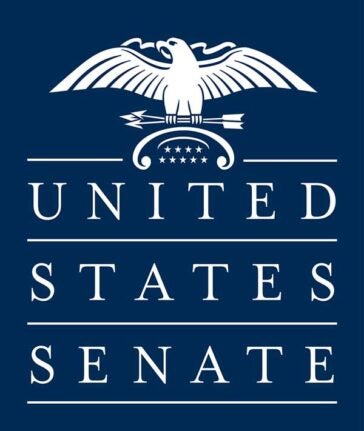 In July, STEEP leads and trainees had the pleasure of hosting representatives from the office of US Senator for Rhode Island, Sheldon Whitehouse. Nisa Pistacchio, Projects Director, and Nick Vincelette, Policy Coordinator, engaged in short roundtable introductions, a discussion of Whitehouse office initiatives and legislative processes. Jitka Becanova, PhD, provided a STEEP overview and during lunch, trainees presented highlights of their impactful research. The goal of this meeting was to feature trainee science while also assisting the legislative need to convey accessible information about PFAS to Rhode Island constituents. Research will be shared with Senator Whitehouse to foster future collaborations, and STEEP leads and trainees plan to meet with Whitehouse staffers a few times each year to discuss findings and provide technical assistance.
In July, STEEP leads and trainees had the pleasure of hosting representatives from the office of US Senator for Rhode Island, Sheldon Whitehouse. Nisa Pistacchio, Projects Director, and Nick Vincelette, Policy Coordinator, engaged in short roundtable introductions, a discussion of Whitehouse office initiatives and legislative processes. Jitka Becanova, PhD, provided a STEEP overview and during lunch, trainees presented highlights of their impactful research. The goal of this meeting was to feature trainee science while also assisting the legislative need to convey accessible information about PFAS to Rhode Island constituents. Research will be shared with Senator Whitehouse to foster future collaborations, and STEEP leads and trainees plan to meet with Whitehouse staffers a few times each year to discuss findings and provide technical assistance.
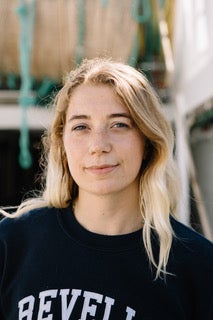 Social Star
Social Star
This summer, the STEEP Research Translation team has been fortunate to harness the social media prowess of trainee and University of Rhode Island PhD candidate, Melissa Woodward, whose work on STEEP Project Four: Detection involves the validation and use of passive samplers for the detection of PFAS in air. Woodward’s bright and witty approach to communication sparkles, not only in her social engagement, images from which you’ll see peppered throughout this newsletter, but also in her writing, as featured in her op-ed.
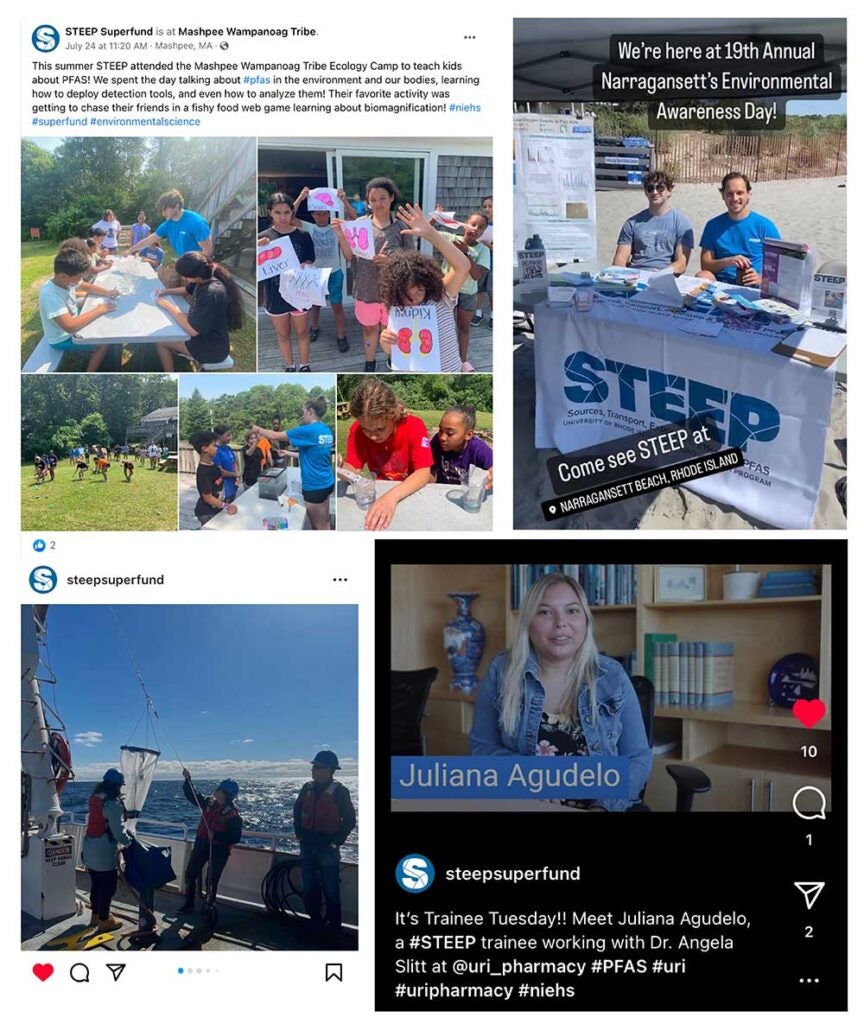
BURNED: Protecting the Protectors
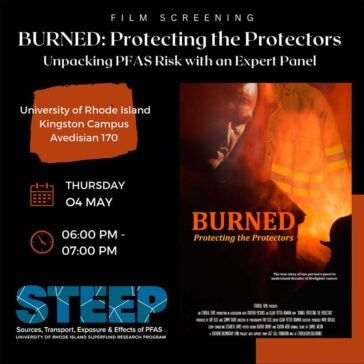 In May, members of the Rhode Island firefighting community and public were invited to the University of Rhode Island for the first state screening of BURNED: Protecting the Protectors, a film revealing PFAS exposure affecting the firefighting community. The screening was followed by a panel discussion featuring Jason Burns, Fall River firefighter and executive director of the Last Call Foundation, with Rainer Lohmann, PhD, STEEP Director, and Angela Slitt, PhD, STEEP lead, Project Three: Metabolic Effects.
In May, members of the Rhode Island firefighting community and public were invited to the University of Rhode Island for the first state screening of BURNED: Protecting the Protectors, a film revealing PFAS exposure affecting the firefighting community. The screening was followed by a panel discussion featuring Jason Burns, Fall River firefighter and executive director of the Last Call Foundation, with Rainer Lohmann, PhD, STEEP Director, and Angela Slitt, PhD, STEEP lead, Project Three: Metabolic Effects.
More about the documentary can be found at Ethereal Films.
 Research Highlights
Research Highlights
Analysis finds marginalized communities disproportionately affected by PFAS
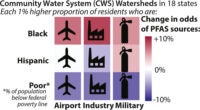 STEEP researchers in the Harvard University Sunderland Lab use statistics to examine socioeconomic and demographic factors influencing the odds of resident exposure to PFAS in community drinking water. The relationship between drinking water quality and socioeconomic status is complex, and solutions to PFAS pollution must take environmental justice into account. Read More…
STEEP researchers in the Harvard University Sunderland Lab use statistics to examine socioeconomic and demographic factors influencing the odds of resident exposure to PFAS in community drinking water. The relationship between drinking water quality and socioeconomic status is complex, and solutions to PFAS pollution must take environmental justice into account. Read More…
Research findings from STEEP Project One: Exposure were prominently featured in a recent video segment on ABC News.
PFAS exposure associated with weight loss relapse in a European dietary study
 Many factors contribute to obesity, though there is gathering evidence that exposure to environmental toxins, such as PFAS, could be contributing to the obesity epidemic. A recent study tested whether PFAS has an effect on body weight increases in an already-established dietary intervention study. They found that certain types of PFAS are associated with increased weight gain beyond what could be attributed to diet-related changes. Read More…
Many factors contribute to obesity, though there is gathering evidence that exposure to environmental toxins, such as PFAS, could be contributing to the obesity epidemic. A recent study tested whether PFAS has an effect on body weight increases in an already-established dietary intervention study. They found that certain types of PFAS are associated with increased weight gain beyond what could be attributed to diet-related changes. Read More…
Research findings of Philippe Grandjean, PhD, and Pál Weihe, PhD, leads on STEEP Project Two: Critical Effects, were featured prominently in a recent New York Times article, ‘Forever Chemicals’ Are Everywhere. What Are They Doing to Us?
Forget diamonds…PFAS are forever: STEEP researchers conclude PFAS may linger in groundwater for centuries
A major source of PFAS contamination in drinking water comes from military bases that use Aqueous Film-Forming Foams (AFFFs) for firefighting and fire training purposes. According to a recent study by STEEP researchers at Harvard University, leftover PFAS at AFFF-contaminated sites accounts for an average of 46% of the total PFAS in contaminated groundwater. As forever chemicals, these compounds don’t break down and could persist in groundwater for centuries. Read More…
Microbial superpowers: environmental bacteria can transform precursor PFAS in AFFF-contaminated sites
Microorganisms can break down many natural and anthropogenic substances, including industrial pollutants, like oil, plastics, and even PFAS. STEEP researchers found that microbes in lake sediments and groundwater may be able to convert precursor PFAS molecules into terminal compounds at an AFFF-contaminated site. Read More…
Easy to introduce, hard to remove…STEEP researchers hone methods for PFAS measurement and treatment
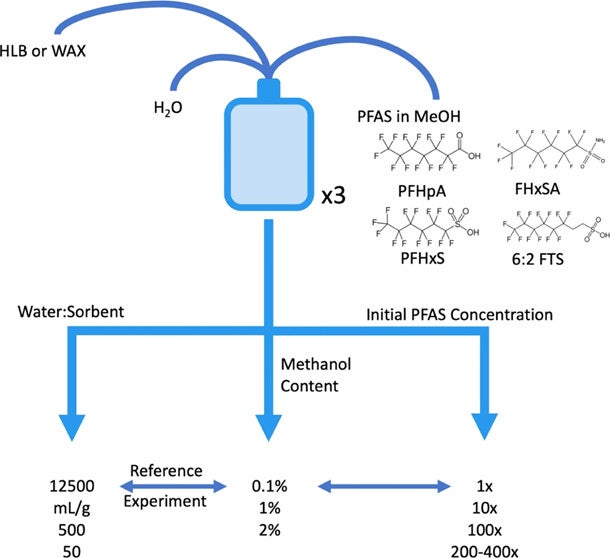 STEEP researchers in the University of Rhode Island Lohmann Lab are focusing their efforts on developing accurate and effective methods for measuring, sampling, and treating PFAS in the environment. Read More…
STEEP researchers in the University of Rhode Island Lohmann Lab are focusing their efforts on developing accurate and effective methods for measuring, sampling, and treating PFAS in the environment. Read More…
Evaluating full environmental impacts of “low concern” polymeric PFAS
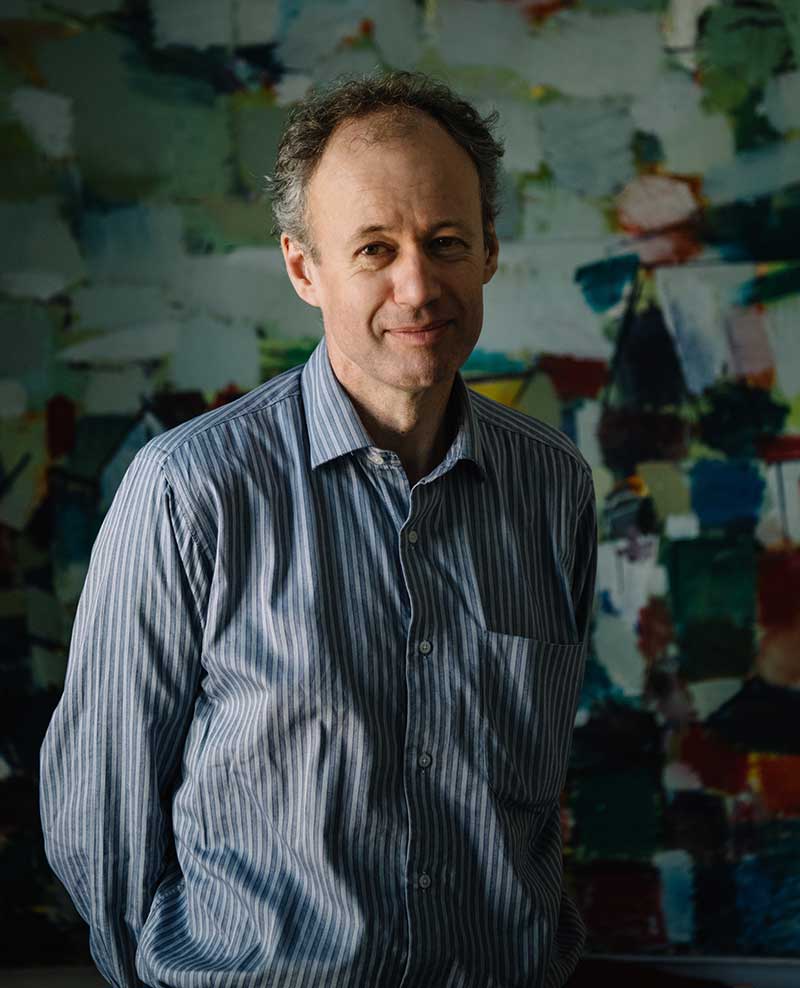 STEEP Director Rainer Lohmann, PhD, and a colleague took some time to evaluate the full “environmental life cycle” of long-chain polymeric PFAS, concluding that stable, biosafe molecules can be harmful when degraded through environmental processes. Read More…
STEEP Director Rainer Lohmann, PhD, and a colleague took some time to evaluate the full “environmental life cycle” of long-chain polymeric PFAS, concluding that stable, biosafe molecules can be harmful when degraded through environmental processes. Read More…
 Program Updates
Program Updates
Welcome, 2022-2027 External Advisory Committee
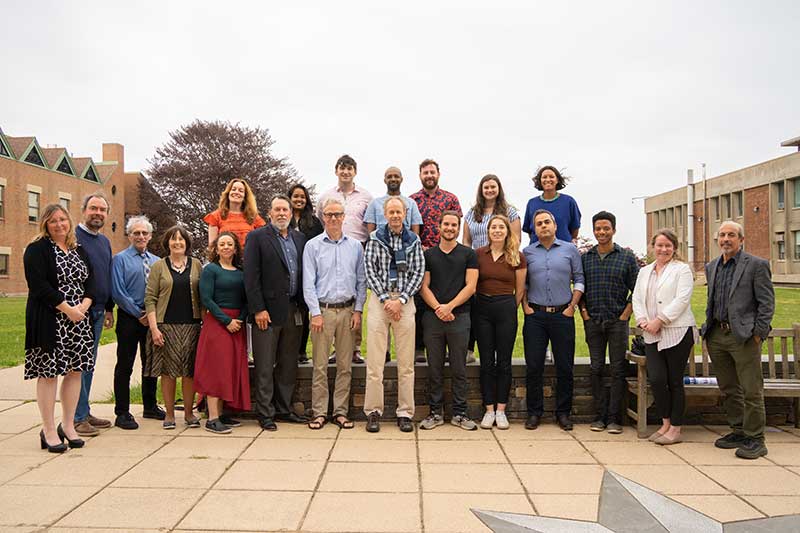
The STEEP team and External Advisory Committee convened in May for two days of research presentations and discussions about the progress and future direction of STEEP. External Advisory Committee for 2022 to 2027 includes David Sherr, PhD, Chair, Boston University School of Public Health; Linda M. Abriola, PhD, Brown University; Gary Ginsberg, PhD, New York State Department of Health; Detlef Knappe, PhD, North Carolina State University; Marc A. Mills, PhD, U.S. EPA ORD; and Mónica Ramírez-Andreotta, MPA, PhD, University of Arizona.
STEEP at FLUOROS 2023
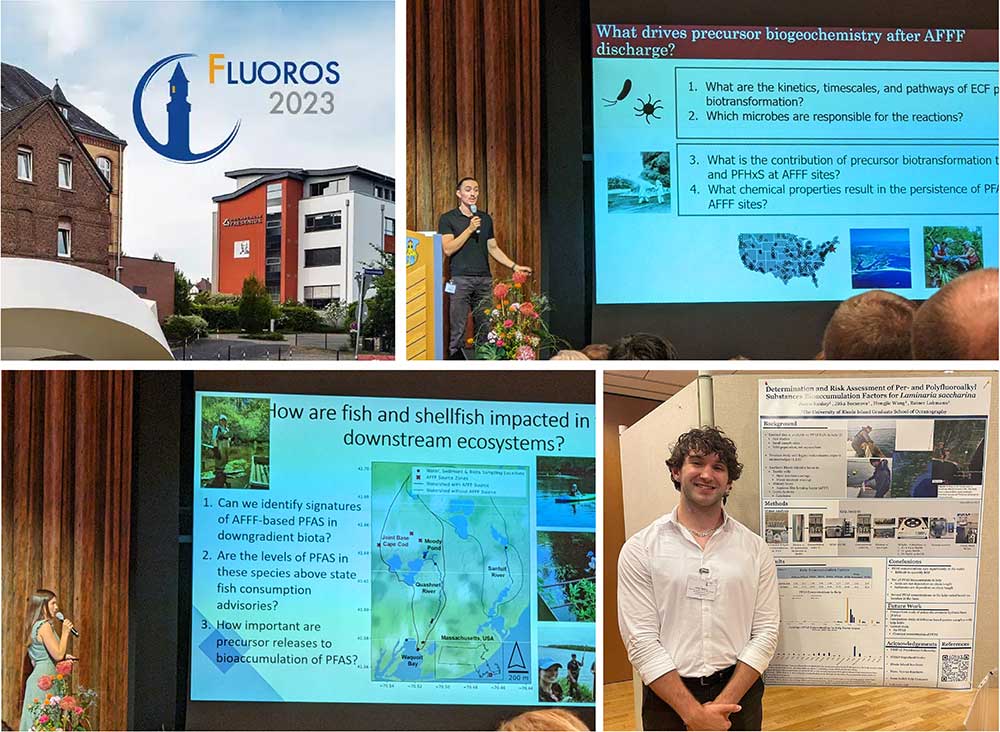
STEEP researchers presented at FLUOROS 2023, an international symposium of PFAS, held in Idstein, Germany, on August 31st and September 1st.
- Heidi Pickard, STEEP trainee, presented “Characterizing the Contribution of PFAS from an AFFF Contaminated Site to Downstream Biota in Coastal Watersheds”. Pickard explains her research further in Should we account for a broader range of PFAS in current fish consumption risk evaluations?
- Justin Sankey, PhD student at the University of Rhode Island and STEEP trainee, presented a poster, “Determination and Risk Assessment of Per- and Polyfluoroalkyl Substances Bioaccumulation Factors for Laminaria Saccharina“.
- Bridger Ruyle, PhD, former STEEP trainee, was awarded Best Oral Presentation for the talk, “Microbially Limited Biotransformation of Precursors Sustains Centurial Persistence of PFAS at AFFF-Contaminated Sites”. Ruyle is now a Postdoctoral Fellow in the Michalak Lab at Carnegie Institution for Science Department of Global Ecology in California.
Comms and Clams: STEEP Trainee Retreat
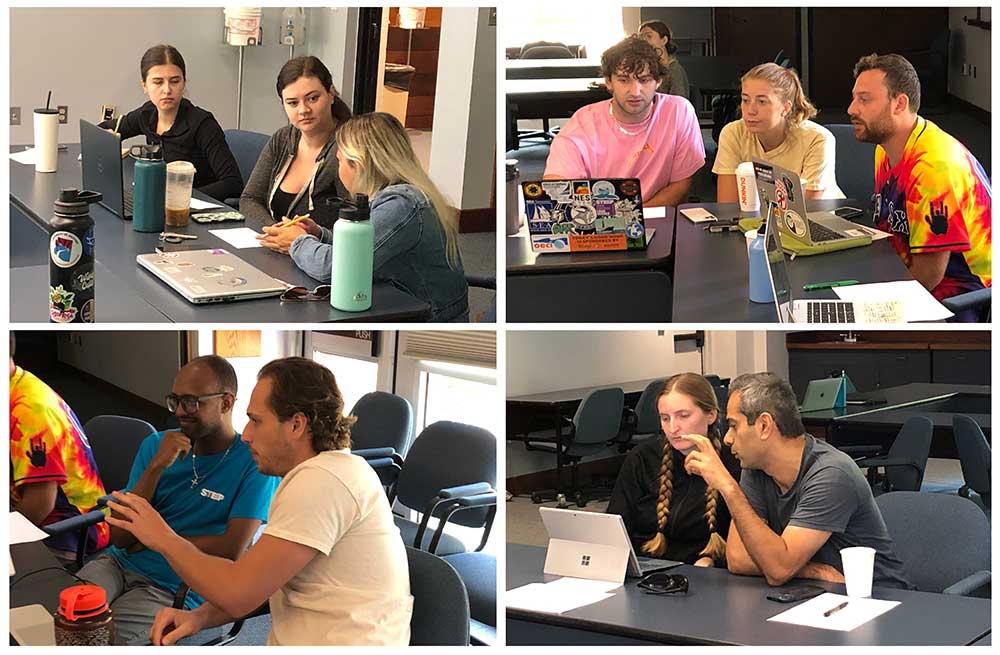 Late summer brings the annual STEEP trainee retreat! As part of a morning workshop hosted at the University of Rhode Island, trainees discussed risk communication with Community Engagement Core co-lead Emily Diamond, PhD, and then learned visual rhetoric in science communication with Research Translation lead Madison Jones, PhD. The day culminated with kayaking on Narrow River and clamcakes, chowder, and volleyball on Narragansett Beach.
Late summer brings the annual STEEP trainee retreat! As part of a morning workshop hosted at the University of Rhode Island, trainees discussed risk communication with Community Engagement Core co-lead Emily Diamond, PhD, and then learned visual rhetoric in science communication with Research Translation lead Madison Jones, PhD. The day culminated with kayaking on Narrow River and clamcakes, chowder, and volleyball on Narragansett Beach.
 Trainee Accomplishments
Trainee Accomplishments
Congratulations! Matt Dunn, PhD
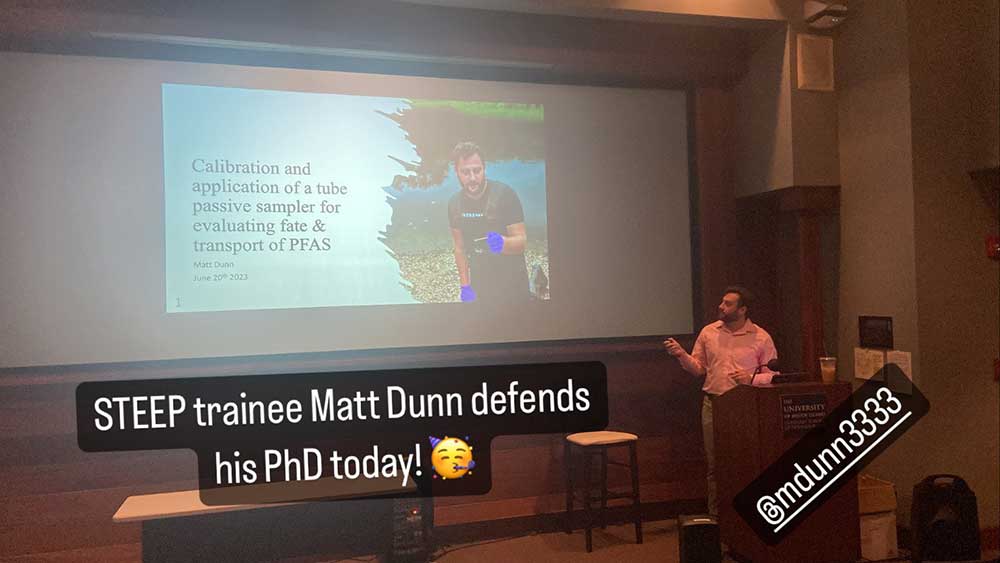 In June, STEEP trainee Matt Dunn defended his Ph.D. Dissertation, “Detection of Per- and polyfluoroalkyl substances using a novel integrative passive sampler”. Beginning in September, Dunn will be employed as Ocean Science Modeler at RPS Group in South Kingstown, RI.
In June, STEEP trainee Matt Dunn defended his Ph.D. Dissertation, “Detection of Per- and polyfluoroalkyl substances using a novel integrative passive sampler”. Beginning in September, Dunn will be employed as Ocean Science Modeler at RPS Group in South Kingstown, RI.
Asta Habtemichael earns the URI Cunnigen Award for Excellence
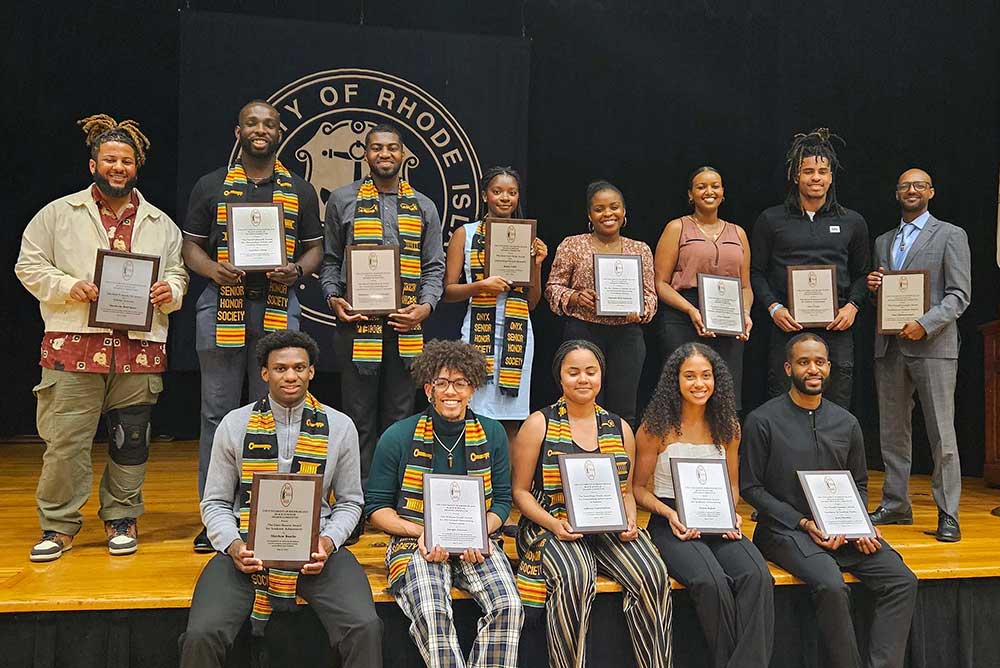 Asta Habtemichael was awarded the Donald Cunnigen Award for Excellence in Graduate Studies at the University of Rhode Island’s 26th Annual Black Scholar Awards. The Cunnigen Award is presented to a graduate student in recognition of outstanding academic performance, active scholarly research, leadership, and service. Habtemichael was also recently honored as the University of Rhode Island Graduate School 2023 Outstanding Champion of Graduate Diversity, Equity, and Inclusion Award.
Asta Habtemichael was awarded the Donald Cunnigen Award for Excellence in Graduate Studies at the University of Rhode Island’s 26th Annual Black Scholar Awards. The Cunnigen Award is presented to a graduate student in recognition of outstanding academic performance, active scholarly research, leadership, and service. Habtemichael was also recently honored as the University of Rhode Island Graduate School 2023 Outstanding Champion of Graduate Diversity, Equity, and Inclusion Award.
 Trainee Features
Trainee Features
Should we account for a broader range of PFAS in current fish consumption risk evaluations?
S ubmitted by Heidi Pickard, PhD Candidate at Harvard University, STEEP Trainee
ubmitted by Heidi Pickard, PhD Candidate at Harvard University, STEEP Trainee
PFAS are a large group of chemicals that build up in food chains and accumulate in seafood over time to levels that may be unsafe for human consumption. Some U.S. states have developed fish consumption advisories for PFAS that limit the number of fish that can be eaten, but these advisories mostly focus on the levels of one compound, perfluorooctane sulfonate (PFOS). With advancements in measurement techniques, researchers are discovering that there are other PFAS that can also accumulate in fish to levels that may warrant concern. STEEP researchers at Harvard University Sunderland Lab, Project One: Exposure, developed a toolbox of analytical methods tested on freshwater fish collected from New Hampshire, U.S. to determine what types of PFAS present potential exposure risks. Read More…
Science conferences: All they’re craic-ed up to be?
 Submitted by Melissa Woodward, PhD Candidate at University of Rhode Island, STEEP Trainee, K.C. Donnelly Externship Awardee
Submitted by Melissa Woodward, PhD Candidate at University of Rhode Island, STEEP Trainee, K.C. Donnelly Externship Awardee
Conferences have long been a pivotal part of any researcher’s career, providing a scientific hub to present and discuss your most recent work and breakthroughs. With the opportunity to mingle amongst scientists from varying areas of research, all in different stages of their careers, there is an additional push placed on young scientists to attend these gatherings, make crucial connections, and get their name out into the scientific community. As one of those young scientists, and as someone fortunate enough to have attended a few conferences, they do provide invaluable opportunities, but they’re in need of some serious revamping. Read More…
Read the 2025 Issue 1 Newsletter
Read the 2024 Issue 2 Newsletter
Read the 2024 Issue 1 Newsletter
Read the Winter 2023 Newsletter
Read the Winter 2022 Newsletter
Read the Spring 2021 Newsletter

